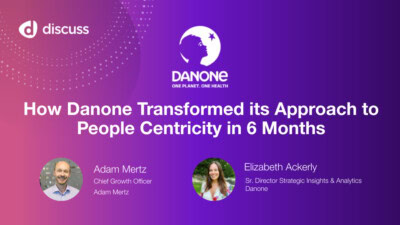AI-Powered Research: A Guide to AI-Moderated Research in Business

AI-moderated research is revolutionizing how businesses collect, analyze, and interpret data. By automating routine tasks and enhancing analytical capabilities, AI tools are enabling businesses to focus on strategic insights and breakthrough innovations rather than time-consuming processes. Interviews with industry leaders have consistently highlighted the positive impact this transformation has on their ability to drive in-depth studies and make informed decisions.
This guide provides a practical roadmap for business leaders, market researchers, and product teams looking to leverage AI in their research processes. We’ll explore current applications, the benefits of AI-powered tools, and emerging trends that will shape the future of market research and customer insights.
Understanding the Basics of AI in Business Research
What is AI-moderated research?
AI-moderated research refers to the integration of artificial intelligence tools that enhance the research process, making it more efficient and insightful. These tools don’t replace human researchers; instead, they amplify their capabilities by automating data collection, streamlining analysis, and uncovering patterns that might otherwise be missed. Businesses benefit from AI’s ability to integrate seamlessly into workflows, producing faster, more accurate results, and helping teams stay ahead of trends.
The key aspect here is collaboration—AI helps businesses maintain the quality, consistency, and objectivity of their research while speeding up discovery. This partnership allows companies to tackle complex questions with greater precision and confidence.
Types of AI Tools Used in Business Research
In today’s data-driven business landscape, various AI tools are available to meet different research needs. Natural Language Processing (NLP) platforms, such as GPT models, assist with content generation, sentiment analysis, and consumer feedback processing. Machine learning algorithms identify patterns in customer behavior and predict future trends. Visual AI tools analyze images and videos, helping businesses with product testing, branding, and more.
AI-powered platforms like Discuss combine multiple capabilities into one powerful interface. These platforms enable businesses to conduct market research efficiently, generate predictive insights, and even simulate outcomes before launching new products or campaigns. Through generative AI, businesses can quickly test different scenarios and optimize their strategies in real-time.
Benefits and Limitations
AI research tools offer tremendous advantages for businesses. They can process large datasets in a fraction of the time it would take manually, uncover hidden insights, and identify emerging trends faster. These tools standardize the research process across teams, reducing administrative burdens and allowing businesses to focus on strategic decision-making.
However, businesses must also be aware of AI’s limitations. AI systems are only as good as the data they are trained on. If the data is biased, AI can perpetuate those biases. Additionally, some AI algorithms operate as “black boxes,” making it difficult to understand how they arrive at specific conclusions. Over-reliance on AI could also hinder skill development, particularly for junior research teams. Ethical concerns surrounding data privacy and transparency are other critical factors to consider.
Enhancing Research Capabilities with AI
AI for Data Analysis and Interpretation
AI is incredibly powerful when it comes to handling large datasets, which have become a staple in modern business research. AI tools excel at sifting through these vast amounts of data to extract meaningful insights that help businesses stay competitive.
For example, AI can be used to track customer behavior and predict trends, providing companies with a clearer picture of their target audience and how their needs might evolve. This level of precision helps businesses make data-driven decisions that lead to more effective strategies and product innovations.
AI is also adept at multivariate analysis, identifying complex relationships between variables that traditional methods might miss. This helps businesses uncover hidden opportunities and refine their strategies accordingly.
Automating Market Research
Conducting market research traditionally involves extensive manual effort, especially in tasks like reviewing large amounts of customer feedback. AI-powered tools can automate much of this process, making it quicker and more accurate. AI can analyze feedback, identify sentiment, and categorize responses, freeing up research teams to focus on deeper insights and strategy development.
In sectors like consumer goods, AI can predict trends in product preferences, helping brands stay ahead of the curve by launching new products or refining existing ones based on real-time data.
Faster Innovation with AI
AI doesn’t just streamline existing processes—it enables new ways of innovating. In industries such as healthcare and pharmaceuticals, AI systems can predict the effectiveness of a drug before it even hits the market. This accelerates product development and reduces the time-to-market, providing a significant competitive edge.
Similarly, in retail, AI can analyze historical sales data to predict future product demand, enabling businesses to optimize inventory management and improve supply chain efficiency.
Addressing Data Privacy and Ethical Concerns
As AI tools handle vast amounts of customer data, ensuring privacy and security is crucial. Businesses need to implement robust data protection measures to safeguard both customer information and research integrity.
AI-powered platforms, such as Discuss, make it easy for businesses to maintain compliance with data privacy regulations while ensuring that customer data is handled responsibly. Transparent data anonymization protocols, secure storage solutions, and informed consent processes are all essential components of ethical AI use in market research.
Ethical AI in Business Research
With the growing use of AI, businesses must be vigilant about the ethical implications. AI systems can inherit biases from the data they are trained on, which could lead to skewed results if not properly addressed. Businesses need to use diverse datasets to ensure that their AI models are fair and represent a wide range of perspectives.
Furthermore, businesses should be transparent about how AI is being used in research and give proper attribution for any AI-generated content. This transparency builds trust with customers and clients and ensures that research findings are credible and actionable.
Navigating the Challenges of AI Integration
Skill Development and AI Use
As AI becomes more integrated into business research, it’s essential that teams continue to develop their research skills, particularly when it comes to interpreting AI-generated insights. AI is a tool, not a replacement for human expertise. Businesses should invest in ongoing training for their research teams, ensuring they understand how to use AI tools effectively while maintaining critical thinking and human judgment.
Adapting to Rapid Technological Changes
AI technology evolves rapidly, which can create challenges for businesses trying to stay ahead. To ensure successful adoption, businesses need flexible systems that can adapt to new AI tools without disrupting ongoing research processes. Building strategic partnerships with agentic partners like Discuss helps ensure access to the latest tools and innovations.
Phased implementations, regular feedback, and continuous evaluation of AI’s effectiveness ensure that businesses are getting the most out of their AI investments while staying aligned with their goals.
Future Trends and Opportunities
AI in business research is poised to continue evolving with advancements in machine learning, natural language processing, and multimodal analysis. Businesses that adopt AI-powered tools will gain a competitive edge by accelerating their research processes, identifying emerging trends faster, and refining their products or services based on real-time insights.
Looking ahead, businesses will increasingly rely on AI to not only streamline research but also to innovate and anticipate market shifts before they happen. Companies that embrace these advancements will be better positioned to lead in their industries and meet the needs of their customers in more meaningful ways.
Discover How Discuss Can Transform Your Research Process
Explore the power of AI in market research with Discuss. Our AI-powered platform helps you collect insights more efficiently, analyze data in-depth, and optimize your strategies for success. Talk to an expert today to see how AI can take your research to the next level!
Ready to unlock human-centric market insights?
Related Articles

What Is Vibe Coding for Market Insights? And Why It Matters for Modern Marketers
By Adam Mertz, Chief Growth Officer at Discuss Let’s be honest. Most marketers don’t wake up thinking, “I need to…
By Adam Mertz, Chief Growth Officer at Discuss Let’s be honest. Most marketers don’t wake up thinking, “I need to…

When to Use Human-Led vs AI-Led Interviews for In-Depth Customer Feedback
AI is everywhere right now. It’s in your inbox. It’s on your social media. It’s taking notes in your meetings. …
AI is everywhere right now. It’s in your inbox. It’s on your social media. It’s taking notes in your meetings. …

6 Ways AI Agents are Redefining Global Human Understanding
Shatter surface-level thinking and build true human understanding with AI Agents We’re overwhelmed by data—but starved for connection. In an…
Shatter surface-level thinking and build true human understanding with AI Agents We’re overwhelmed by data—but starved for connection. In an…



